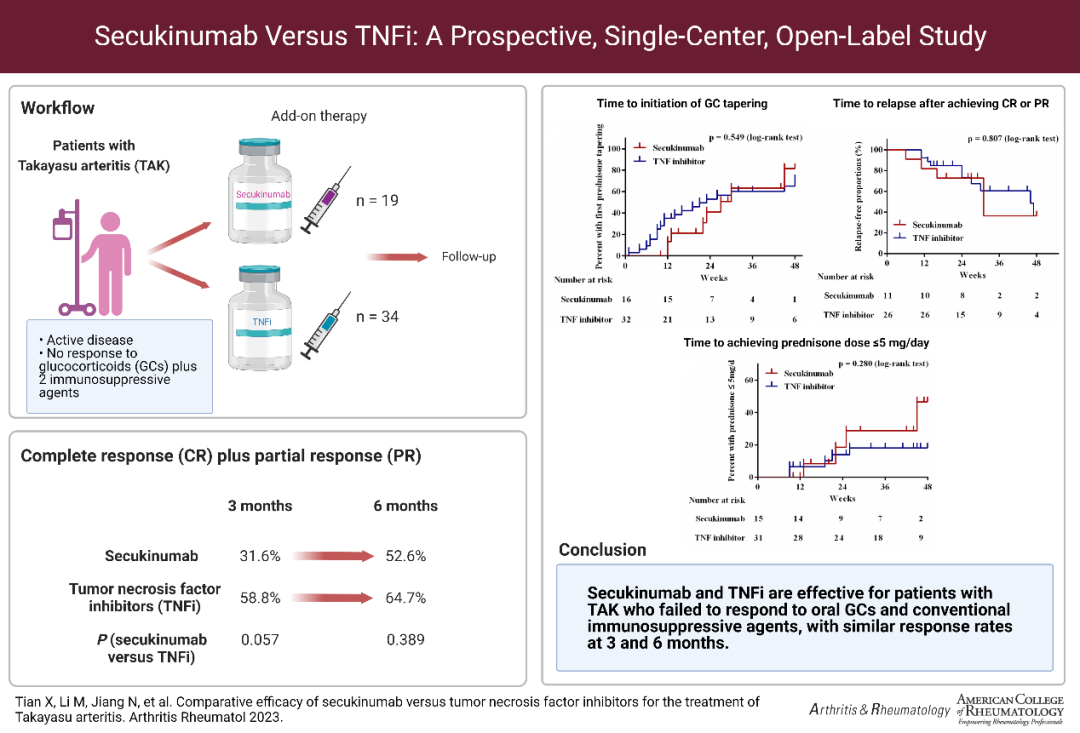Recently, outcomes of the clinical study on the innovative treatment of Takayasu arteritis (TAK), which was conducted by the team of Zeng Xiaofeng, Li Mengtao and Tian Xinping from the Department of Rheumatology, PUMCH in collaboration with the University of Pennsylvania in the United States, have been published in “Arthritis & Rheumatology” (IF: 13.3), a top international journal of rheumatology. The study compared the efficacy and safety of secukinumab, an anti-interleukin-17 (IL-17) monoclonal antibody, and tumor necrosis factor inhibitors (TNFi) in the treatment of refractory TAK. The article has drawn widespread attention in the medical community.

TAK is a relatively rare form of systemic vasculitis that primarily involves the aorta and its branches. It is most common in young oriental women with a high recurrence rate. For some patients who are resistant to existing drugs, it is difficult to achieve glucocorticoid tapering and stop the disease progression. Treatment for refractory TAK has remained a predicament for the rheumatologists.
Glucocorticoids remain the first-line therapy for TAK, but most patients experience disease relapse during glucocorticoid tapering. Limited evidence suggests that traditional immunosuppressive agents such as methotrexate and mycophenolate mofetil and biologic agents such as TNFi and antagonists of interleukin-6 receptor have some efficacy in treating TAK, but the majority of patients do not respond well to these medications and become refractory. New therapeutic approaches are urgently needed to treat refractory TAK.
Basic studies have shown that tumor necrosis factor alpha (TNFα) may be involved in the pathogenesis of TAK. Small-scale case series studies have shown that TNFi was, to a certain degree, effective in treating patients with refractory TAK and has been recommended by the European Alliance of Associations for Rheumatology(EULAR) and the American College of Rheumatology (ACR) for treating the disease. Recent basic research has confirmed that Th-17 cells and their associated cytokines IL-17A and IL-23 also play an important role in the pathogenesis of TAK. This suggests that targeting IL-17 is expected to be a new therapeutic approach for this disease, but there are no relevant clinical studies on treating TAK with IL-17 inhibitors.
This study enrolled a total of 53 patients with refractory active TAK. The results of the study at a mean follow-up of 36 weeks showed that patients in the secukinumab group remained stable in terms of reduction in levels of inflammatory markers and vascular lesions shown on imaging, with no significant differences from those in the TNFi group. More importantly, nearly one third of the patients in the secukinumab group achieved glucocorticoid tapering, and that secukinumab was still effective in some patients who previously failed to respond to or relapsed after treatment with IL-6 receptor antagonists or TNFi.

▲The study is a prospective, single-center, open-label study
This study is globally the first clinical study on treating TAK with an IL-17A inhibitor, filling the gap with a new drug option that blesses the vast number of TAK patients. Also with the largest sample size on TAK treatment with TNFi in the world to date, this study sheds light on a new therapeutic approach for treating refractory TAK.
Translated by Liu Haiyan
Edited by Jiang Nan and Wang Yao
